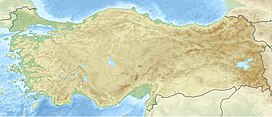Mount Ararat
| Mount Ararat | |
|---|---|
|
|
|
| Highest point | |
| Elevation | 5,137 m (16,854 ft) See Elevation section |
| Prominence | 3,611 m (11,847 ft) Ranked 48th |
| Isolation | 379 kilometres (235 mi) |
| Parent peak | Mount Damavand |
| Listing |
Country high point Ultra Volcanic Seven Second Summits |
| Coordinates | 39°42.113′N 44°17.899′E / 39.701883°N 44.298317°ECoordinates: 39°42.113′N 44°17.899′E / 39.701883°N 44.298317°E |
| Geography | |
| Location | Iğdır Province (65%) and Ağrı Province (35%), Turkey |
| Parent range | Armenian Highlands |
| Geology | |
| Mountain type | Stratovolcano |
| Last eruption | 1840 |
| Climbing | |
| First ascent | 9 October [O.S. 27 September] 1829 Friedrich Parrot, Khachatur Abovian, two Russian soldiers, two Armenian villagers |
| Designations | |
|---|---|
|
IUCN Category II (National Park)
|
|
| Official name | Ağrı Dağı Milli Parkı |
| Designated | 1 November 2004 |
Mount Ararat (/ˈɑːrəˌrɑːt/ ar-UH-rat;Turkish: Ağrı Dağı; traditional Armenian: Մասիս, Masis) is a snow-capped and dormant compound volcano in the eastern extremity of Turkey. It consists of two major volcanic cones: Greater Ararat, the highest peak in Turkey and the Armenian plateau with an elevation of 5,137 m (16,854 ft); and Little Ararat, with an elevation of 3,896 m (12,782 ft). The Ararat massif is about 40 km (25 mi) in diameter.
Scholars agree the biblical "mountains of Ararat" do not refer to specifically Mt. Ararat. Nevertheless, it has been perceived as the traditional resting place of Noah's Ark since the 11th century. It is the principal national symbol of Armenia and has been considered a sacred mountain by Armenians. It is featured prominently in Armenian literature and art and is an icon for Armenian irredentism. Along with Noah's Ark, it is depicted on the coat of arms of Armenia.
...
Wikipedia


